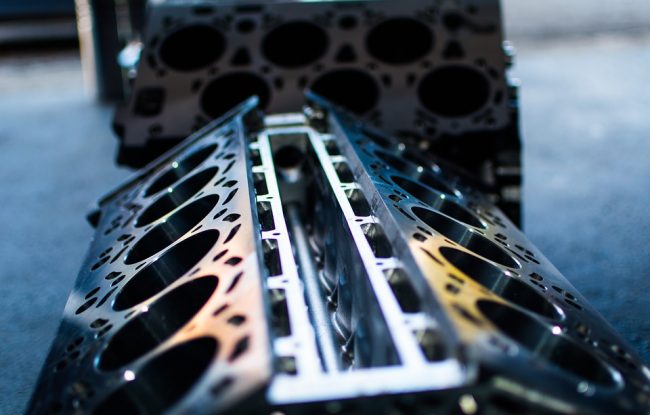What is an engine block?
The engine block, also known as the cylinder block, is the key component of an internal combustion engine, where the power to drive the vehicle is generated by igniting a fuel/air mixture to produce an explosion.

How does an engine block work?
The engine block performs several functions, including:
- Assisting with the pumping of water from the radiator to the different parts of the engine to cool them down.
- Housing pistons in several cylinders that move the vehicle’s crankshaft.
- Sealing in the lubricating oil via the oil pan attached to the bottom, and acting as the housing for the various valves, gaskets and seals that work together to keep the engine and the car as a whole running safely.
What causes a crack in the engine block?
Heat is the primary enemy of the engine block. If it overheats, the metal will become stressed and will eventually fail, leading to a crack in the engine block. Discover a few of the main culprits below:
- The primary culprit of a cracked engine block, often linked to coolant issues, is excess heat. Overheated sections of the engine expand, while cooler areas do not. This places stress on the engine block, causing a crack in the engine to form.
- Another issue leading to a cracked engine block and still related to excess heat is water pump failure. The failure of a water pump disables proper coolant flow, leading to severe overheating.
- Casting failure during injection molding can also cause issues with the engine block. If the molding results in thinner sections on the engine block metal, the application of heat to these thinner areas can lead to the formation of engine cracks.
Cracked engine block symptoms: How to identify signs of a cracked engine block
A cracked engine block can cause a range of problems. Ultimately, since the circulation system that cools the engine is comparatively fragile, a cracked engine block will lead to coolant leaking out of the area it is needed and leaving the engine to overheat. If left untreated, this will lead to engine failure and may result in the vehicle having to be written off.
Cracked engine block symptoms can include:
- Discoloration in car oil and antifreeze mixing
- Leaking oil or coolant
- Engine overheating caused by leaking antifreeze
- Low engine compression and poor engine performance
- Frozen coolant in the car radiator
- Low levels of coolant
- Excessive engine smoke
- Visible crack in the block
How much will an engine block repair cost at a workshop?
A cracked engine block will leave you stranded and, more often than not, facing a huge repair bill (at least $1,200, probably more).
Cracked engine block repair costs vary depending on the damage, the repair method and your vehicle. In some cases, it may be cheaper to replace the engine or the car entirely. But if the crack in the engine block isn’t too severe, K-Seal could fix the issue for a fraction of the cost.
Can K-Seal fix my cracked engine block?
K-Seal and K-Seal HD will permanently repair most engine block failures including:
- Engine coolant leaks
- Cracked engine blocks
- Porous blocks
- Core plug or freeze plug failure
With a replacement block costing thousands, it’s well worth trying to fix the problem with K-Seal before going down this route. K-Seal will seal the cracks in engine blocks that cause coolant leaks, to get you back on the road and save you a small fortune.
Want to get hold of a bottle to fix your engine block? Use our simple stockist search and get back on the road – fast.
Engine block sleeves and resleeving: What you need to know
Engine block sleeves are used in both high performance motors, such as racing cars, and everyday vehicles to repair or restore damaged cylinders inside the engine block. These sleeves fit over the cylinder’s original lining to bring it back to the correct circumference, keeping it in place to help the engine maintain proper compression and performance.
They’re typically used when cylinders are:
- Excessively worn and tapered down
- Scored
- Cracked
If the damage is more severe, particularly inside the cylinders, engine block resleeving may be required. This process involves removing the damaged lining and installing new sleeves to restore engine performance.
Key things to know about engine block resleeving:
- Often used in high-performance or racing engines, but also suitable for everyday vehicles.
- A highly technical job that should be done by professionals.
- Helps extend the life of an engine that would otherwise need replacing.
That said, if the crack is limited to an external area and causing a coolant leak, a product like K-Seal, K-Seal Ultimate or K-Seal HD may be able to seal it — saving you the cost and downtime of a full rebuild.
Could Other Parts of My Engine Be Affected?
Although your engine block could be the source of your engine troubles, it might not be the only component you need to take a look at. Select an engine part in the interactive diagram below to explore your engine and the important components that keep everything ticking over.